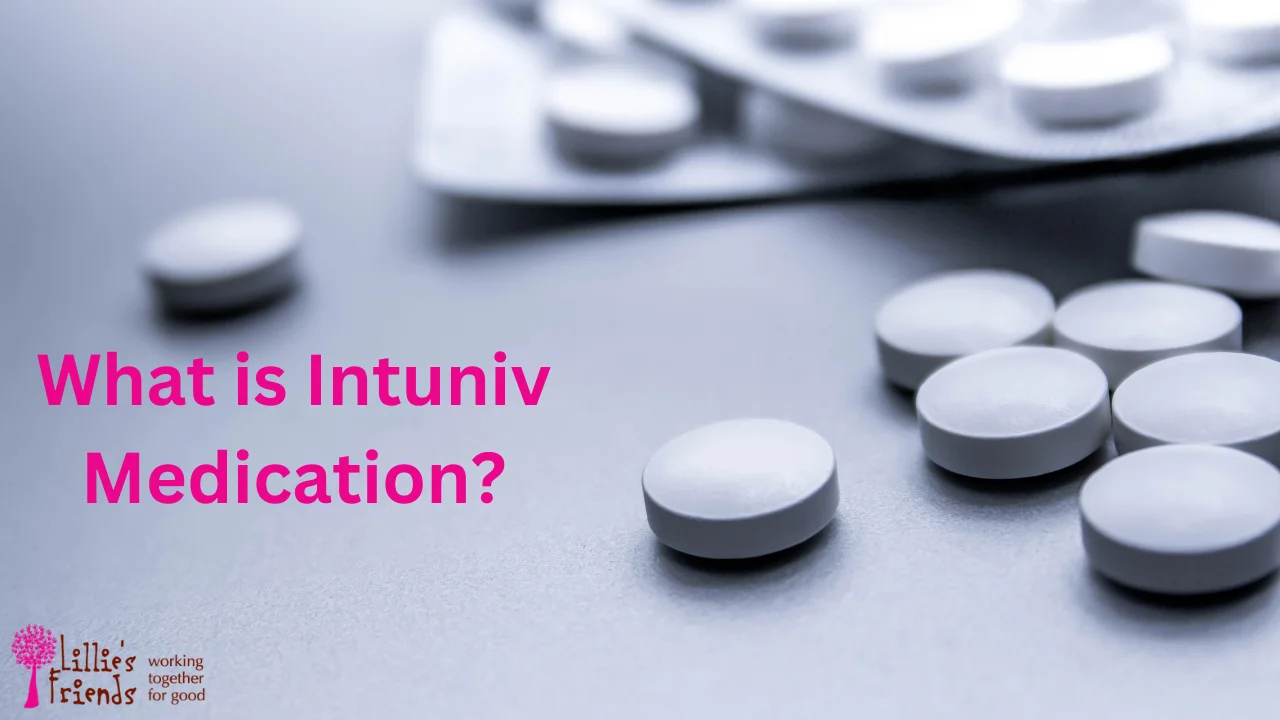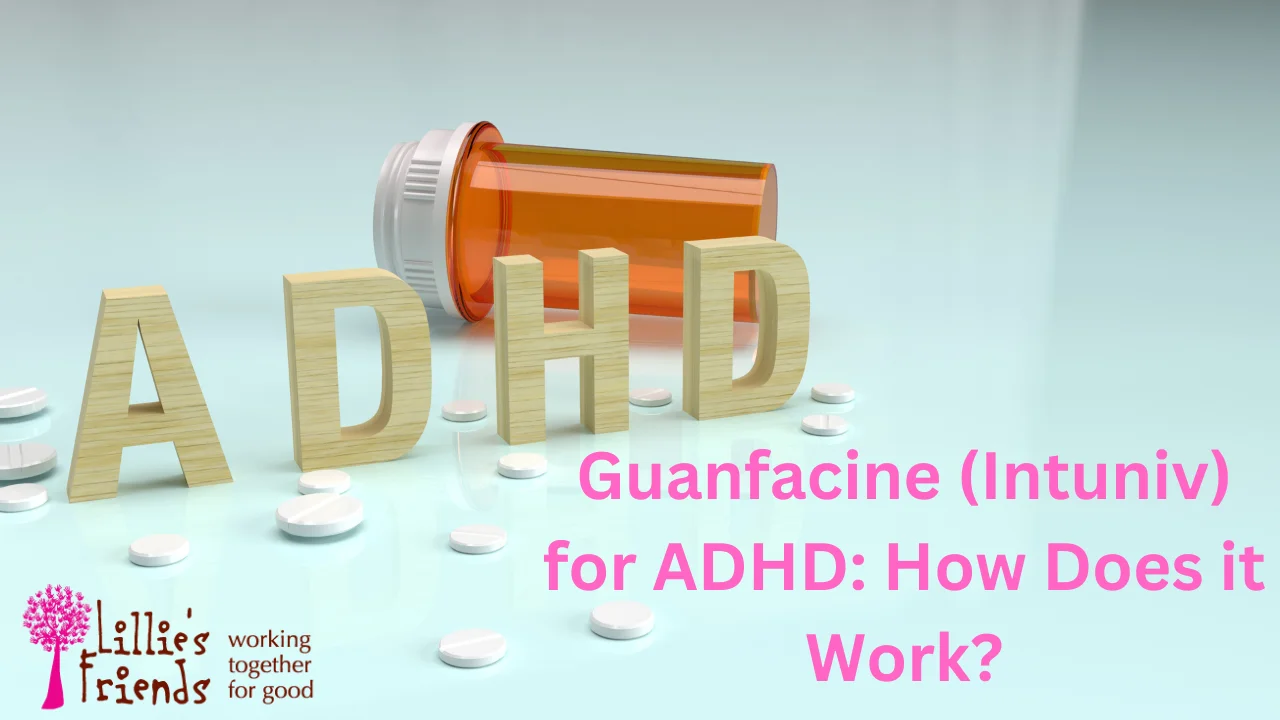Medical Disclaimer
The medicines listed on this website are only there to give you knowledge. Just because they are on the list doesn’t mean that anyone will be given them; in the end, treatment decisions are up to the healthcare workers. The medicines on this list are not all of them. Doctors may recommend other drugs, even ones that don’t contain stimulants, depending on the patient’s specific health needs and circumstances. Read more
Highlights
- A licensed non-stimulant drug for ADHD in children and adolescents, Intuniv is frequently used off-label in adults.
- It is utilized as the second line of treatment because it is not a stimulant. If stimulant drugs aren’t working for you or you’re searching for a medication with fewer side effects, your doctor might prescribe you Intuniv.
- Like any medication, Intuniv may have some undesirable side effects. These consist of lightheadedness, sleepiness, or dizziness.
- It’s critical to consider any other drugs you may be taking while taking Intuniv. It may interfere with certain medications.

Intuniv (Guanfacine): What Is It?
An FDA-approved ↗ drug called Intuniv (guanfacine) is used to treat ADHD. Although it is officially approved for use in children and adolescents up to the age of 17, adults are frequently prescribed it off-label. It is assumed that this medication is more secure because it is not a stimulant and is not a controlled substance.
Alpha-2A adrenergic receptors↗ are impacted by Intuniv (guanfacine). It relaxes the blood vessels and lowers blood pressure and heart rate while increasing blood flow. Off-label uses for Intuniv include PTSD, tic disorder, and anxiety disorders.
For ADHD, when is guanfacine prescribed?
When other ADHD drugs (like stimulants) don’t work, Intuniv (guanfacine), a second-line treatment, is typically used. It is a dependable choice in the following circumstances:
- When stimulants don’t function.
- If stress and anxiety are co-occurring.
- If you find it difficult to manage the varying emotions.
- If you’re tired from sleep problems.
- If ADHD is accompanied by additional problems, such as substance abuse.
What Benefits Does Guanfacine Offer for ADHD?
Since their initial approval in Japan in 2019 as a treatment for adult ADHD, ↗ guanfacine extended-release tablets have been shown to be low-risk and effective in reducing symptoms linked to the diagnosis criteria.
Intuniv helps you maintain focus and concentration by altering certain chemicals in the brain. This improves your ability to handle logical and reasoning problems by regulating attention and impulse control.
Other symptoms of ADHD, such as hyperarousal, social aggression, rejection sensitivity, and emotional sensitivity, can also be alleviated by this medication. Unlike stimulants, Intuniv lowers the brain’s adrenaline levels and aids in symptom management for conditions that stimulants might not be able to address as well.
Concerning the Dosage
Typically, Intuniv tablets are available in extended-release form, which allows for a gradual release into your system. These tablets usually have a starting dose of 1 mg, which can be raised to a maximum of 3 or 4 mg based on need and time. Only a healthcare professional can recommend the appropriate dosage for an individual based on a number of factors, so patients should never change it without first consulting their doctor.
The usual dosages are given purely for informational purposes. Kindly seek advice from your healthcare provider and adhere to their recommendations.
Guanfacine’s Ideal Time of Day to Take It for ADHD
Extended-release guanfacine tablets, which are commonly prescribed for ADHD, typically don’t have strict guidelines about when to take them. To guarantee steady concentration, guanfacine must be taken at the same time every day. When taking Intuniv, it is best to stay away from fatty meals and grapefruit juice, as these can enhance the medication’s absorption and raise its levels in the body, which could lead to side effects and affect how you react to it overall.
The usual recommendation for guanfacine IR is to take it in the evening.
Keep in mind that every person reacts differently to this medication. Guanfacine taken in the evening causes sleep problems for some patients, while taking it in the morning causes drowsiness for others. To determine the optimal timing, it’s crucial to monitor your response to guanfacine. If you have trouble, talk to your doctor.
How to Keep and Get Rid of This Drug
Proper storage and disposal of medications are essential for their safe and responsible use. Don’t forget to store Intuniv (guanfacine) in the original bottle. To keep out moisture, it should be securely closed. Make sure it’s out of reach of your kids or pets.
Bring your medication to the pharmacy or use a drug-pack program to properly dispose of it if it has expired or your doctor advises changing it. Regarding how to dispose of your medication, you can also consult a healthcare professional or your pharmacist.
If I miss a dose, what should I do?
Don’t worry if you forget to take Intuniv. Take the missed dose right away if you discover it within a few hours. However, don’t double up if the next dose is almost due; instead, follow your plan and take the next regular dose as planned. If you frequently forget to take your medication, ask your doctor about potential remedies.
Guanfacine (Intuniv) Side Effects
Like any medication, Intuniv can have some undesirable side effects, even though it is a useful solution for many people.
Common Side Effects
- Having a slight sense of drowsiness
- Moderate to mild headache
- Having a slight lethargic feeling (fatigue)
- Dry mouth
- Constipation may result from slowed digestion.
Less Common Side Effects
- Vomiting or feeling queasy
- Dizziness or lightheadedness
- Pain or upset stomach
- Nervousness or anxiety
Rarely, Intuniv may result in cardiac issues ↗ or allergic reactions. Although it was initially prescribed to treat high blood pressure, it can alter heart rate or blood pressure. Although there isn’t much evidence to support these claims, it’s still crucial to let your doctor know if you encounter any unsettling side effects.
Symptoms of Withdrawal
Abruptly stopping Intuniv can cause withdrawal symptoms. Your body must now learn to function without Intuniv because it has become accustomed to it after taking it for a considerable amount of time. As a result, withdrawal symptoms could include:
- Nervousness
- Agitation
- Tremors
- Headaches
To find out if stopping or reducing Intuniv is necessary and how to do it properly, consult your doctor. They will assist you in devising a strategy to reduce withdrawal symptoms.
Interactions with Drugs
It’s crucial to let your doctor know if you take any other medications while taking Intuniv. Sometimes it’s necessary to take different medications for different conditions, and while they should cooperate, they can also conflict.
The following drugs may interact negatively with Intuniv and result in side effects:
- Antihypertensive drugs: If you take Intuniv with other blood pressure drugs, your blood pressure may drop too low.
- Central nervous system depressants: Combining tranquilizers and guanfacine may cause you to become more drowsy or stop breathing.
- CYP3A4 inhibitors: Antibiotics, protease inhibitors, and antifungals can raise your body’s level of Intuniv and have adverse effects. ↗
- Tricyclic antidepressants (TCAs): Guanfacine and TCAs together may cause hypotension.
Always talk to your doctor about the medications you are taking, and don’t forget to let them know about any vitamins, supplements, or over-the-counter medications you may be taking. Additionally, they might be able to communicate with Intuniv.
Risks and Things to Think About
Despite the fact that guanfacine is usually well tolerated, there are a few risks to be mindful of:
- When taking Intuniv for the first time or increasing the dosage, one may experience lightheadedness or dizziness and possibly faint. Heart problems are among the possible long-term effects.
- You must monitor your heart rate while taking Intuniv. Because Intuniv can lower your heart rate, it is especially crucial if you take any other medications that affect it.
- You might feel sleepy or less attentive, which increases the risk of accidents when operating machinery and driving.
- Guanfacine has a higher potential to exacerbate symptoms in people with a history of mental health issues like depression. ↗ Don’t forget to talk to your healthcare provider about this.
Precautions
Before taking guanfacine medication, you should be aware of the following precautions:
- If you know you are allergic to something or have ever experienced an allergic reaction to a medication, let your doctor know.
- To prevent drug interactions, let your doctor know about all the other prescription drugs and dietary supplements you take.
- Don’t forget to let your doctor know if you have any additional health issues.
- If you are pregnant, nursing, or intend to become pregnant, let your doctor know.
In conclusion, does guanfacine work?
Stimulant drugs like Ritalin or Adderall are typically the first choice for treating ADHD. However, non-stimulants like guanfacine might be a better choice if you are not responding to stimulants or if you want a less harmful option. Although it is prescribed off-label for adults with ADHD, it has been shown to be effective in treating this disorder.
To find out which ADHD treatment strategy will work best for you, schedule an online consultation with one of our medical specialists right now.
FAQ
How does guanfacine make you feel?
Guanfacine is a non-stimulant that can reduce impulsivity and promote calmness and relaxation due to its antihypertensive properties.
How long does it take for guanfacine to work for ADHD?
Guanfacine may take some time to fully take effect because it is not a stimulant drug. Significant effects might take two to four months to manifest, but the initial improvement might be apparent in two to four weeks. Please speak with your healthcare provider if you have any concerns regarding the efficacy of the selected course of treatment.
Does guanfacine increase focus?
Indeed, its antidepressant and mood-stabilizing qualities enhance concentration and reduce impulsivity.
How effective is guanfacine for ADHD?
Guanfacine has been shown to help both adults and children with ADHD symptoms. Despite being a second-line treatment, it may be beneficial for people with ADHD who are unable to take stimulants.
What are the benefits of Intuniv?
Impulsivity can be decreased, focus and concentration can be enhanced, and sleep quality can be improved with Intuniv. Additionally, it stabilizes mood.
Is guanfacine the same thing as Adderall?
In terms of their modes of action and other characteristics, these drugs are entirely different. Guanfacine functions as a non-stimulant, whereas Adderall is a stimulant.
- Non-stimulants last longer and have a slower onset than stimulants.
- While stimulants are more likely to be abused, non-stimulants are less likely to do so.
- While Adderall is more focused, non-stimulants like guanfacine also have antihypertensive and antidepressant effects in addition to treating ADHD.
- Non-stimulant side effects are typically more tolerable than stimulant side effects.
To find out which medication might be more appropriate for you, it is crucial to have a thorough consultation with your healthcare provider.











